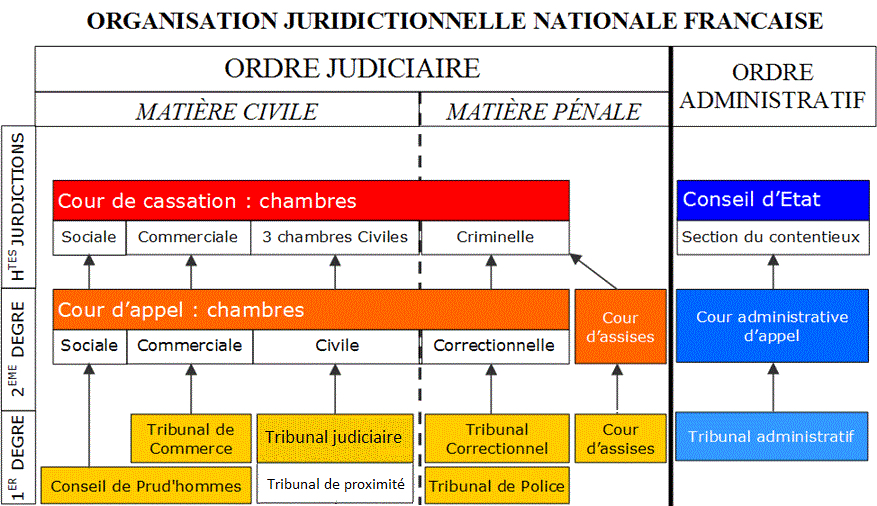
The judicial system includes all civil and criminal cases that will be brought before the judicial judge.
Court of Cassation
It is composed of 5 civil chambers (commercial, social, 3 civil chambers) and a criminal chamber. Its role is to check that the trial judges (those of the Court of Appeal and the first courts) have correctly applied the law and case law in their decisions. There is only one in France. It is seized by a litigant by means of an appeal.
Court of Appeal
It is seized by an applicant who was not satisfied with the judgment of the first instance of jurisdiction. It will therefore re-examine the case both in law and in fact. There are 36 courts of appeal in France. In criminal matters, the counterpart of the Assize Court (reserved for the trial of crimes) is called the Court of Assizes of Appeal. Before 2000, it was impossible to appeal against a judgment of the Assize Court.
The first level of jurisdiction
It varies according to the cases brought before the judicial judge.
Commercial Court
Competent for all disputes between traders and commercial companies.
Tribunal de Grande Instance (TGI)
Competent for all disputes over € 10,000 such as divorces, filiation, civil status …
Criminal Court
Competent for all crimes. In French law, the law qualifies as offenses offenses punishable by a prison sentence or a fine of at least 3750 euros.
Assize Court
Competent for crimes punishable by life imprisonment. Its particularity is to be composed of a jury of individuals.
Labour Court
Competent for any dispute between employees or apprentices with their employer (employment contracts, etc.).
District Court (TI)
Competent for disputes of less than € 10,000.
Police Court
Competent for 5th class contraventions with fines. Decision taken by a single judge at IT.
The Proximity Judge
Competent for disputes of less than € 4,000 (neighborhood conflicts).
Jurisdiction of the Administrative Order
These courts are responsible for adjudicating cases between private individuals and the administration.
Administrative Tribunal
Competent for all disputes between users and public authorities, i.e.:
- State administrations,
- regions,
- Departments
- municipalities,
- state-owned enterprises.
Administrative Court of Appeal
If one of the parties is not satisfied with the first judgment, he or she may appeal. The Administrative Court of Appeal then re-examines the case already decided.
Council of State
Created in 1799, the Council of State is currently organized by Book I of the Code of Administrative Justice. Its specificity is to be both judge in first and last resort, judge of appeal of certain judgments rendered by administrative courts and judge of cassation. It verifies that the courts and tribunals have correctly applied the law. It decides directly on certain cases concerning the most important decisions of the State authorities. For some (rare) cases, he is an appellate judge. It is located in Paris, at the Palais Royal.
